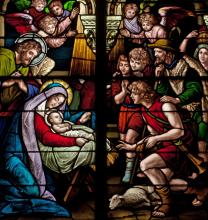David

Though they gave respectable answers, I was amazed no one directly quoted the Christian Gospels on the subject.
The Gospel of Mark provides one saying of Jesus directly applicable to this situation. But when we examine subsequent uses of that saying in the other Gospels, we can see why none of the 60 Minutes interviewees dared quote that particular verse.

According to several sources, the number 40 is used almost 150 times in the Old and New Testaments. Some examples: Jesus was tempted in the wilderness for 40 days and 40 nights. There were 40 years of wilderness-wandering for the Jewish people fleeing bondage in Egypt. Noah and his family were in the ark for 40 days and 40 nights of the flood. There were 40 days and 40 nights of fasting while Moses was on Mount Sinai. Jonah was given 40 days to convert the people of Nineveh. Saul, David, and Solomon reigned 40 years each.

If we were to go by the titles of books about leadership, we might be tempted to imagine that good leadership is a matter of following the right set of instructions. And this might work if we could all agree what good leadership is. The roiling presidential season just might suggest otherwise.

The poetic prayers, songs, and laments of the book of Psalms were recorded to teach worshipers how to praise God, as well as to lament and grieve. When undergoing times of agony or when words are not enough, the Psalms can express the painful emotions for us, as processing emotion helps us to move forward with difficult choices.
Much of the Psalms were attributed to David, including the prayer of Psalm 55—a lament about suffering violence at the hands of a loved one. Many victims of abuse find themselves alone and abandoned by family and friends who become impatient and exasperated by their ongoing struggle with loving their abuser. Praying through a Psalm may be an emotional refuge during such a painful time.

One in thirty-one. That’s how many Americans are in in jail, in prison, on probation, or on parole. In the U.S., our incarceration rate is 10 times higher than that of other countries while our actual crime rate is lower than those same countries. Citing a 600% increase in the prison population since the 1960’s, with no correlating increase in crime, Michelle Alexander has called mass incarceration “the new Jim Crow.” When people of color represent 30% of the U.S. population, but 60% of those incarcerated, we are in league with David, staring at a towering giant, armed with a prayer and a handful of stones.
While the work before us is daunting, people of faith are called to fight giants. The Spirit who we remember in Pentecost, the Spirit who set the world on fire, has trusted us with this work. We are giant slayers, by God’s grace. For this reason, it is fitting that we revisit the story of the first giant slayer, a young boy who tended sheep and fought off bears and lions.

IN THE LECTIONARY PASSAGES for these weeks following Pentecost, we find God working in and through the ordinary: a shepherd boy, bread, dancing. In each passage God breaks through with incredible revelation; some promise, some challenge, some person unexpected. Not everyone in the passages notices. Paying attention is crucial. We’ll have to be open to being caught off guard, being surprised. The Holy Spirit gives us eyes to see. As we engage in leadership and ministry these weeks, what we are sure to find is Jesus showing up in all the places we might not expect, when we’re washing dishes, driving in the car, eating a meal. And we certainly don’t expect him in the faces of the white poor, in the lives of racially profiled black youth, or in the stories of the undocumented.
We bring into worship our vestments, our commentaries, our manuscripts. God speaks through these—no surprise there. But God grips us in these unexpected places. These are what we should carry with us into worship every Sunday. But we will need more than eyes to make them preach; we’ll need power. The Holy Spirit gives that too. It makes the heart come alive. The gospel artist Fred Hammond said it best: “When the Spirit of the Lord comes upon my heart, I will dance like David danced!” Dancing and singing shape the heart of God’s new community, for joy, for freedom, for hope. May we be open to the Spirit’s vision and boldness!

I CONFESS THAT I do not often use the Revised Common Lectionary. As a Bible professor, I prefer to read texts in their larger literary and historical contexts. When a brief reading from one time period is lifted out of its context and juxtaposed with another written many centuries later, it can feel like an invisible hand is forcing me to compare apples and oranges—or even apples and mushrooms.
Nevertheless, I have been enriched by this year’s readings for Advent and Christmas. My “larger historical context” has become the sweep of a thousand years of Israelite history, from King David to the birth of the “son of David.”
For Christians, the coming of Jesus was a singularity. Though we focus on his birth in this season, that lower-class event was barely noticed at the time, and it is not mentioned by two of our gospel writers. It is his entire life, ministry, death, and resurrection that echoes throughout the ages and ushers in our hope of salvation. Our prophets and psalmists from the Hebrew Bible could not foresee details of the Christ-event from their perspectives centuries earlier. Yet their intuitions and hints and poetic expressions of joy over God’s in-breaking from their times are now borrowed to give voice to our exultation over Jesus’ coming today.
In a culture measured by quarterly profits and immediate gratification by credit card, we need a longer view to better understand what God is doing throughout human history. These Advent readings call us beyond the present to the millennia of the past and the hope of the future stretching to eternity.

Feeling anxious about your tax liability as April 15 nears? The Bible has many references to taxes that will sound strangely relevant at this time of year — beginning with the story of David and Goliath.
Many remember a teenage boy offended by insults thrown by a giant foe against his nation and God himself, who volunteers to go into battle with a slingshot. But did you know that a tax incentive was part of his prize?
Visiting the battlefield, David learns: “The king will give great wealth to the man who kills (Goliath) and will exempt his family from taxes in Israel,” (1 Samuel 17:25).
Throughout Scripture, tax discussions mark many passages, as ancient men and women worried about how they would pay.

What if what you thought were advantages were actually disadvantages? And what you thought were disadvantages ended up being what actually makes people successful?
So embarks best-selling author Malcolm Gladwell of Blink, The Tipping Point, Outliers, and What the Dog Saw in his new book: David and Goliath. In the same clear, concise style that made his other books so intriguing, Gladwell challenges yet another widespread assumption — that being the underdog tends to make one an underdog forever.
Instead he argues that being the underdog can give one the upper hand. In his signature approach, Gladwell supports his hypothesis with a series of narratives, from the classic case of David and Goliath to the forgiveness one Canadian Mennonite woman was able to work towards after her daughter was murdered. Like his previous books, David and Goliath is both entertaining and thought provoking and obliges readers reflect over their lives and reconsider personal “disadvantages” that actually required them to learn skills they otherwise might not have had.

Author Malcolm Gladwell may not be known for writing on religion. His New York Times best-selling books “The Tipping Point,” “Outliers,” “Blink” and “What the Dog Saw” deal with the unexpected twists in social science research. But his newest book, “David and Goliath: Underdogs, Misfits, and the Art of Battling Giants,” also includes underlying faith-related themes, and not just in the title.
Gladwell said that while researching the book, he began rediscovering his own faith after having drifted away. Here, he speaks with RNS about his Mennonite family, how Jesus perfectly illustrates the point in his new book and how Gladwell’s return to faith changed the way he wrote the book.